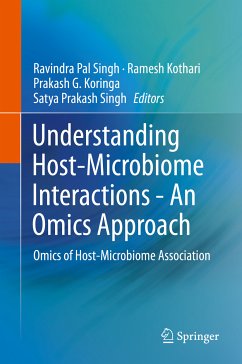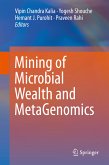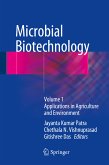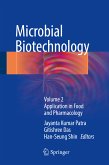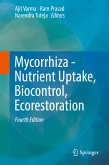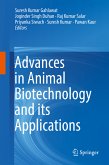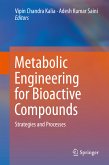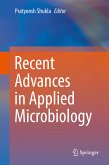Understanding Host-Microbiome Interactions - An Omics Approach (eBook, PDF)
Omics of Host-Microbiome Association
Redaktion: Singh, Ravindra Pal; Singh, Satya Prakash; Koringa, Prakash G.; Kothari, Ramesh
161,95 €
161,95 €
inkl. MwSt.
Sofort per Download lieferbar

81 °P sammeln
161,95 €
Als Download kaufen

161,95 €
inkl. MwSt.
Sofort per Download lieferbar

81 °P sammeln
Jetzt verschenken
Alle Infos zum eBook verschenken
161,95 €
inkl. MwSt.
Sofort per Download lieferbar
Alle Infos zum eBook verschenken

81 °P sammeln
Understanding Host-Microbiome Interactions - An Omics Approach (eBook, PDF)
Omics of Host-Microbiome Association
Redaktion: Singh, Ravindra Pal; Singh, Satya Prakash; Koringa, Prakash G.; Kothari, Ramesh
- Format: PDF
- Merkliste
- Auf die Merkliste
- Bewerten Bewerten
- Teilen
- Produkt teilen
- Produkterinnerung
- Produkterinnerung

Bitte loggen Sie sich zunächst in Ihr Kundenkonto ein oder registrieren Sie sich bei
bücher.de, um das eBook-Abo tolino select nutzen zu können.
Hier können Sie sich einloggen
Hier können Sie sich einloggen
Sie sind bereits eingeloggt. Klicken Sie auf 2. tolino select Abo, um fortzufahren.

Bitte loggen Sie sich zunächst in Ihr Kundenkonto ein oder registrieren Sie sich bei bücher.de, um das eBook-Abo tolino select nutzen zu können.
This book offers up-to-date information on different microbiomes, their community composition and interactive functions with the host, bringing together information from diverse research reports to provide an overview of the rapid developments in meta-omics technologies.
It is a valuable resource for scientists, researchers, postgraduate and graduate students interested in understanding the impact and importance of next generation sequencing technologies on different hosts and their microbiomes.
- Geräte: PC
- ohne Kopierschutz
- eBook Hilfe
- Größe: 7.74MB
Andere Kunden interessierten sich auch für
![Mining of Microbial Wealth and MetaGenomics (eBook, PDF) Mining of Microbial Wealth and MetaGenomics (eBook, PDF)]() Mining of Microbial Wealth and MetaGenomics (eBook, PDF)113,95 €
Mining of Microbial Wealth and MetaGenomics (eBook, PDF)113,95 €![Microbial Biotechnology (eBook, PDF) Microbial Biotechnology (eBook, PDF)]() Microbial Biotechnology (eBook, PDF)161,95 €
Microbial Biotechnology (eBook, PDF)161,95 €![Microbial Biotechnology (eBook, PDF) Microbial Biotechnology (eBook, PDF)]() Microbial Biotechnology (eBook, PDF)121,95 €
Microbial Biotechnology (eBook, PDF)121,95 €![Mycorrhiza - Nutrient Uptake, Biocontrol, Ecorestoration (eBook, PDF) Mycorrhiza - Nutrient Uptake, Biocontrol, Ecorestoration (eBook, PDF)]() Mycorrhiza - Nutrient Uptake, Biocontrol, Ecorestoration (eBook, PDF)121,95 €
Mycorrhiza - Nutrient Uptake, Biocontrol, Ecorestoration (eBook, PDF)121,95 €![Advances in Animal Biotechnology and its Applications (eBook, PDF) Advances in Animal Biotechnology and its Applications (eBook, PDF)]() Advances in Animal Biotechnology and its Applications (eBook, PDF)129,95 €
Advances in Animal Biotechnology and its Applications (eBook, PDF)129,95 €![Metabolic Engineering for Bioactive Compounds (eBook, PDF) Metabolic Engineering for Bioactive Compounds (eBook, PDF)]() Metabolic Engineering for Bioactive Compounds (eBook, PDF)113,95 €
Metabolic Engineering for Bioactive Compounds (eBook, PDF)113,95 €![Recent advances in Applied Microbiology (eBook, PDF) Recent advances in Applied Microbiology (eBook, PDF)]() Recent advances in Applied Microbiology (eBook, PDF)113,95 €
Recent advances in Applied Microbiology (eBook, PDF)113,95 €-
-
-
This book offers up-to-date information on different microbiomes, their community composition and interactive functions with the host, bringing together information from diverse research reports to provide an overview of the rapid developments in meta-omics technologies.
It is a valuable resource for scientists, researchers, postgraduate and graduate students interested in understanding the impact and importance of next generation sequencing technologies on different hosts and their microbiomes.
It is a valuable resource for scientists, researchers, postgraduate and graduate students interested in understanding the impact and importance of next generation sequencing technologies on different hosts and their microbiomes.
Dieser Download kann aus rechtlichen Gründen nur mit Rechnungsadresse in A, B, BG, CY, CZ, D, DK, EW, E, FIN, F, GR, HR, H, IRL, I, LT, L, LR, M, NL, PL, P, R, S, SLO, SK ausgeliefert werden.
Produktdetails
- Produktdetails
- Verlag: Springer Nature Singapore
- Seitenzahl: 368
- Erscheinungstermin: 1. September 2017
- Englisch
- ISBN-13: 9789811050503
- Artikelnr.: 53059355
- Verlag: Springer Nature Singapore
- Seitenzahl: 368
- Erscheinungstermin: 1. September 2017
- Englisch
- ISBN-13: 9789811050503
- Artikelnr.: 53059355
- Herstellerkennzeichnung Die Herstellerinformationen sind derzeit nicht verfügbar.
Dr. Ravindra Pal Singh is a research assistant at the Department of Biochemistry, John Innes Centre, Norwich, UK. He obtained his Ph.D. from CSIR-CSMCRI, India in 2013. During his scientific career, he has received several prestigious scholarships, such as an outstanding postdoctoral fellowship provided by Tel Aviv University, Israel in 2013, a JSPS postdoctoral fellowship in 2013 and a Dr. D. S. Kothari postdoctoral fellowship provided by UGC, India in 2016. He has published 28 articles in different scientific journals and received a patent while working in the field of microbial ecology and bacteriology. He can be contacted at ravindrapal.1441@gmail.com Dr. Ramesh Kothari, is currently working as a professor at Department of Biosciences, Saurashtra University, Rajkot, Gujarat, India. He received a Ph.D. in Microbiology from the Saurashtra University, Rajkot in 2003. Soon after he joined Christ College Rajkot where he served as an assistant professor for 14 years. He completed his postdoctoral research at Rutgers University Newark, USA. His research work focuses on bioremediation and metagenomics. He has more than 41 international peer reviewed research publications to his credit. Dr. Prakash G. Koringa, has been an assistant professor at Anand Agricultural University (AAU), Gujarat, India since 2004. He obtained his Ph.D. from the Department of Animal Biotechnology, College of Veterinary Science and Animal Husbandry, AAU Anand, Gujarat. His work focuses on rumen metagenomics, caecal microbiome in broilers and their application for the host health. He has published several research papers in peer reviewed journals as well as a number of book chapters. Dr. Satya P. Singh, is currently working as Professor & Head at UGC-CAS Department of Biosciences, Saurashtra University, Rajkot, Gujarat, India. He completed his masters in Microbiology from the G. B. Pantnagar University of Agricultue & Technology, Pantnagar, India and carried out his doctoral research at the Griffith University, Brisbane Australia. Prof. Singh has worked at the National Food Research Institute, Tsukuba, Japan as a visiting scientist and also visited Yangoon University, Myanmar as visiting professor. Prof. Singh has been working on the diversity, phylogeny and enzymatic characteristics of the halophilic/haloalkaliphilic bacteria, actinomycetes and archaea of various saline ecosystems. He has published 82 research papers and contributed 17 book chapters in various books.
Part I: Next generation sequence technology.- 1. Development of diverse sequencers machines for analysing host microbial communities.- 2. Metagenomics, metatranscriptomics and metaproteomics tools for unveiling microbiome of hosts.- 3. Challenges for analyzing large amount of data generated from diverse next generation sequence technology.- Part II: Plant microbiome.- 4. Finding function of the plant phyllospheric microbial communities through metagenomics and metatranscriptomics analysis.- 5. Metagenomics and metatranscriptomics studies of the plant rhizosphere.- 6. Unraveling plant microbe interactions by using next generation sequencing technologies.- 7. Modulation of microbiome in order to increase health and growth of the host.- 8. Plant-bacterial interaction in heavy metal environmental.- 9. The microbiome of the estero salado mangrove.- 10. Metagenomics of endophytic microbial communities of plant.- Part III: Animal microbiome.- 11. Advancements in molecular techniques and bioinformatics for understanding the rumen microbiome.- 12. Ecology and evolution of the termite gut microbiota.- 13. Microbial quality of insects.- 14. Insect gut microbiome and its potential for biotechnological application.- 15. Microbiome modulate behaviour of animal.-Part IV: Human microbiome. - 16. Gut bacterial diversity of the tribes population of world.- 17. Modulation of gut microbiome by different types of food habit.- 18. Diversification of microbial communities of human skin and their role in defense.- 19. Insight into microbiome of human milk via -omics technologies.- Part V: Marine microbiome. - 20. Multi-omic approaches for mapping interactions among marine microbiomes.
Part I: Next generation sequence technology.- 1. Development of diverse sequencers machines for analysing host microbial communities.- 2. Metagenomics, metatranscriptomics and metaproteomics tools for unveiling microbiome of hosts.- 3. Challenges for analyzing large amount of data generated from diverse next generation sequence technology.- Part II: Plant microbiome.- 4. Finding function of the plant phyllospheric microbial communities through metagenomics and metatranscriptomics analysis.- 5. Metagenomics and metatranscriptomics studies of the plant rhizosphere.- 6. Unraveling plant microbe interactions by using next generation sequencing technologies.- 7. Modulation of microbiome in order to increase health and growth of the host.- 8. Plant-bacterial interaction in heavy metal environmental.- 9. The microbiome of the estero salado mangrove.- 10. Metagenomics of endophytic microbial communities of plant.- Part III: Animal microbiome.- 11. Advancements in molecular techniques and bioinformatics for understanding the rumen microbiome.- 12. Ecology and evolution of the termite gut microbiota.- 13. Microbial quality of insects.- 14. Insect gut microbiome and its potential for biotechnological application.- 15. Microbiome modulate behaviour of animal.-Part IV: Human microbiome. - 16. Gut bacterial diversity of the tribes population of world.- 17. Modulation of gut microbiome by different types of food habit.- 18. Diversification of microbial communities of human skin and their role in defense.- 19. Insight into microbiome of human milk via -omics technologies.- Part V: Marine microbiome. - 20. Multi-omic approaches for mapping interactions among marine microbiomes.
